
The overall objective of IS is to enhance your Japanese proficiency and autonomous learning skills by focusing on your individual study objectives. It is your responsibility to design the project, but you will be supported by your instructor and a “support group” of your peers to achieve your goals. You may choose a theme related to your interests and long-term goals. You will finalize and share the outcome and/or your experience with an audience at “IS Fair” before the summer program is completed. You are required to report the progress of your IS to your instructor and support group members at least once a week so that you can refine your work. Participants are strongly encouraged to choose a theme for their IS before the program begins. (Please see the past examples below.) This will provide you with sufficient time for a full discussion of your project’s objectives, methods, timelines, etc. with your instructor and support group members.
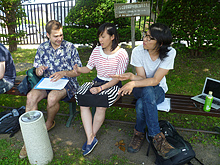
Support groups consist of 3-4 people from the same class and meet once a week (usually on Tuesday afternoon) to keep each other on track to accomplish their objectives.
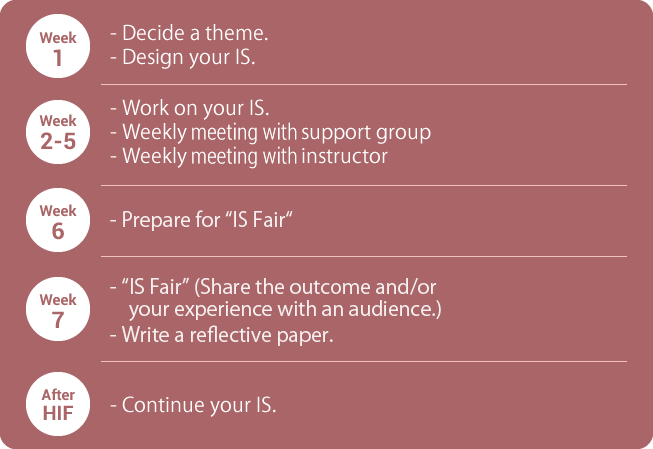
IS is not limited to a research project or a PowerPoint presentation. Ideally, you should be able to continue learning about your topic after returning to your home country. Therefore, we encourage you to find a topic or activity that truly interests you.
IS can be categorized into four types based on theme and methodology. The followings are topics former participants selected and put great effort into accomplishing. Please remember that the “IS Fair” is only one process of IS, not the final goal.
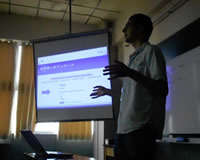
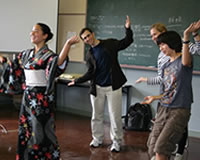
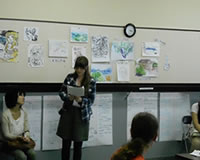
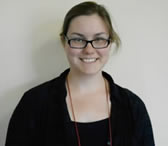
I was able to meet two priests and a monk, something I haven’t even gotten to do in America, and discuss their religion with them. It was a really unique opportunity.
Having a support group was nice to have to check in each week and be held accountable for my progress, because I’m something of a procrastinator. And it was nice to have people to encourage me through tough parts and be able to encourage them as well.
I felt a bit more in touch with Japan’s culture- religion is so inseparable from culture here that you have to understand both. And I learned some great new vocabulary.
Notre Dame
The HIF program was super fun and a great learning opportunity! Getting to meet so many new people who all share the same goal of ...
Michigan
There are lots of different ways to enjoy your study abroad and they're all valid! Lots of students choose to travel lots or visit lots of attractions ...
Pennsylvania
HIF is extremely rewarding and truly a once-in-a-lifetime chance. I think it's easier to be integrated into a host family as a younger college student ...
I loved the HIF program! I was able to learn so much - not only the Japanese language but also the culture and background of people ...
Notre Dame
I'm very grateful I got the opportunity to stay in Hakodate since it's such an underrated part of Japan. My favorite part was visiting landmarks like ...
Michigan
If you feel you are struggling to speak, this program will make sure you go back feeling confident. You'll be only speaking Japanese - during class ...
Kansas
It might be difficult, but you will have the experience of a lifetime, something you will cherish for years to come.